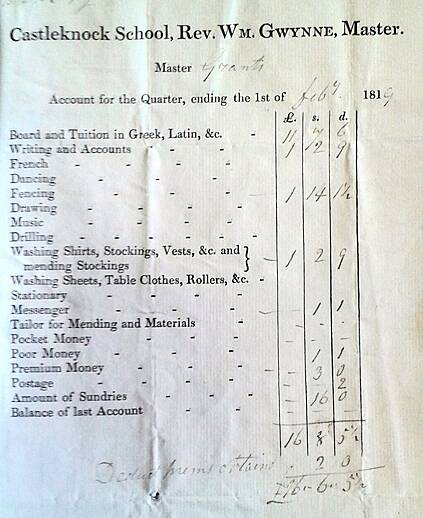1819 Knock Fee Note
the predecessor school

1819 Castleknock quarterly fee note
The letters of one Thomas J. Grant to various family members, written 1824-1836, are now saved for posterity at the National Library. Included therein are fourteen documents relating to his education at Castleknock, 1814-1821, including the above copy of an 1819 quarterly fee note.
The master stated therein, Rev. Wm. Gwynne, was not a Vincentian and for a good reason, for the school referenced was a small Church of Ireland school established in 1808 by Dr Gwynne and a Mr Swanzy for the sons of clergy who wished to enter Trinity College. By the Summer of 1834 that school had been for some years discontinued and the demesne of Castleknock was on the market.
It was purchased by a group of intrepid young Vin's and after the usual delay in clearing the title, they took possession on the 24th of October, 1834. The day was held in remembrance as the date of their transmigration as they called it, from their temporary habitation in Ushers Quay to their new permanent home. They at once named the place St. Vincent's College, recalling the ultimate purpose for which they had come together; and took to themselves the title of Vincentians, following the custom of the Dominicans and Franciscans who were popularly called after their founders.
SVC as we know it today opened the following autumn on the 28th August 1835.
Forty-seven names are found on the roll in the first year - the buildings then could not receive more. These students came not merely from Dublin, but from widely separated parts of Ireland: John Lynch was from Clones; Patrick Power from Waterford. The latter was the youngest boy in the first year; the former was the first to arrive in the College. John Lynch at the time was about 18 years of age. He had already been at a private school in Lucan, and a boarder in St. Joseph's Seminary in Clondalkin. John later joined the Vincentians, went out to pioneer missionary work in Texas, became Bishop, and later first Archbishop of Toronto. Many years after the opening day he wrote the story of his arrival and first days in Castleknock. His account may be repeated here:
The first three days at the opening of the College of St. Vincent's, Castleknock had something providential, and I may say, wonderful about them. That it was formerly a preparatory seminary for the sons of Protestant ministers before going to Trinity College, was in itself a remarkable thing.
I was one of the first to enter, with Mr. Andrew Brady, since dead. I came on the Sunday before the opening Monday, and had time to roam about the hills and inspect everything. On Monday morning about eleven o'clock some boys arrived; we became friends at first sight. Each had a supply of cakes and other good things, so that when dinner time came round, we had but little appetite. After dinner followed the distribution of places in the dormitories and study hall. We roamed through the ruins of the Castle, we walked in its moats and amongst the trees that covered the hill. We visited the Castle on the bare hill, and amused ourselves by trying who could run up and down most quickly. At the arrival of every car all sport was stopped to see the next boy. After a while he joined us with eyes red from weeping, but with pockets full of candies. Night came, and all were tired, and ready for sleep, but there was great noise in dragging about trunks and valises.
Our Professors were kind and perfect gentlemen, and this smoothed over all uneasy feelings. We had bread and beer for lunch at twelve o'clock. We dined at three or half.-past three. Our breakfast was bread and milk, but the city boys, accustomed to tea, longed for home times.
Parents of today can but yearn for the twenty-five guinea then annual fees and their sons can only dream about “bread and beer" for lunch.
